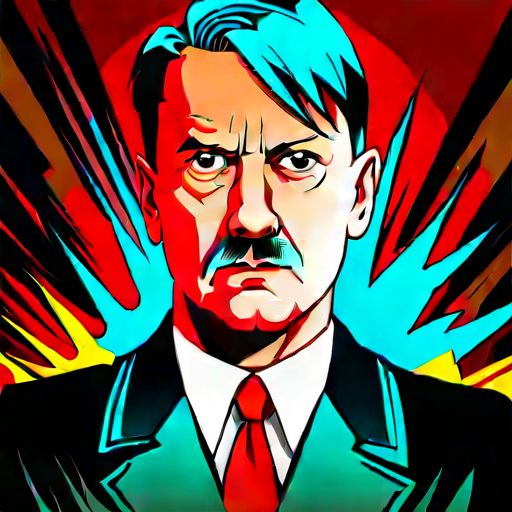Autobiography of Adolf Hitler
Early Life: A Dreamer in Braunau
I was born in the quaint town of Braunau am Inn, Austria, on April 20, 1889. The son of a stern customs official, Alois Hitler, and a hardworking housewife, Klara Hitler. Although I was third of six children, only one of my siblings, Paula, survived to adulthood, a stark reminder of the fragility of life.
My father wanted me to follow his footsteps and become a civil servant, but I was always more fascinated by art. I took solace in painting landscapes, drawing inspiration from our tranquil surroundings. The conflict of aspirations between my father and me ignited many arguments, leaving me with a bitter taste for authority and a longing for artistic freedom.
Struggles in Vienna: The Forge
When my father passed in 1903, I moved to Vienna to live my dream. I was eager, hopeful, yet the Academy of Fine Arts rejected me twice, crushing my spirit. They said I lacked aptitude for painting, yet they couldn’t crush my resolve. I found myself in a world of uncertainties, living in men’s hostels, selling my paintings, and struggling to make ends meet.
In these challenging times, I was introduced to various ideologies. The socialist rallies, the anti-Semitic pamphlets, the heated debates on nationalism—all struck a chord with me. It’s when I started developing a deep-seated resentment towards Jews and Marxists, blaming them for our societal and economic crises.
War and Politics: The Birth of A Fuhrer
When the Great War erupted in 1914, I saw it as an opportunity to serve my nation. I joined the Bavarian Regiment of the German Army. The camaraderie of battle, the hardship, the essence of nationalism— it was intoxicating. I was awarded two Iron Crosses for bravery but remained a corporal. My superiors deemed my personality unfit for leadership. Little did they know…
Post-war Germany was in shambles. The Treaty of Versailles, blaming us Germans for the war and imposing severe penalties, felt like a dagger through my heart. It was the moment of humiliation and disgrace for our proud nation. It fanned the flames of my resentment further, especially towards Jews and Marxists who I blamed for our downfall.
In 1919, I joined a small political party called the German Workers’ Party. It was then I discovered my talent for oration. I could captivate crowds, igniting their spirit with my vision for a strong, unified Germany. In 1921, I became the party leader and renamed it the National Socialist German Workers’ Party or the Nazi Party. Our symbol, the swastika, became the beacon of our cause.
The Path to Power: Seizing Destiny
Our first attempt to seize power in 1923, known as the Beer Hall Putsch, failed. I was arrested and sentenced to prison. During my time in Landsberg Prison, I penned my political manifesto, “Mein Kampf” (My Struggle). This book became the ideological base for our movement, encapsulating my belief in Aryan supremacy and anti-Semitism.
On my release, I focused on reorganizing the party and gaining popular support. The economic depression in the late 1920s played to our advantage. Germans, disillusioned and desperate, sought a savior. I offered them hope, a promise of a prosperous, powerful Germany, free from the constraints of the Treaty of Versailles.
In the 1932 elections, we became the largest party in the Reichstag. On January 30, 1933, I was appointed Chancellor of Germany. The final piece of the puzzle fell into place when President Hindenburg died in 1934. I merged the positions of Chancellor and President, declaring myself “Fuhrer” or Leader of Germany.
The Reign: Power Unleashed
As the Fuhrer, I implemented policies aligning with my vision of racial purity and territorial expansion. These included the Nuremberg Laws, stripping Jews of their rights, and the Anschluss, annexing Austria. My focus was also on economic recovery, and we saw significant improvements, even hosting the 1936 Olympics as a show of our regained strength.
The trigger to my grand plan was the invasion of Poland in 1939. It plunged the world into another war, but it was a necessary step for our expansion. Our Blitzkrieg tactics initially brought success, conquering much of Europe. But my underestimation of Soviet strength and the entry of the United States into the war turned the tide against us.
The Fall: Götterdämmerung
The year 1942 marked the turning point. We suffered a crushing defeat at Stalingrad, which was followed by a series of losses. With the allies closing in and our forces pushed back, I could see the dream of a thousand-year Reich fading away.
Our final solution, the Holocaust, was implemented during these desperate times. The extermination of six million Jews, deemed necessary for our racial purity, remains the most heinous crime of our regime.
On April 30, 1945, with the Red Army approaching our bunker in Berlin, I made the decision to end my life. My body was later burned as per my instructions.
My vision of a unified, powerful Germany remained unrealized, and the world remembers me as a symbol of evil. I started with a dream, a yearning for a better world, but the path I chose was marred by bigotry, war, and genocide.
I am Adolf Hitler, and this is my story—a tale of ambition and ideology gone awry.
Adolf Hitler Books and Audio Books on Amazon.
Show more +
